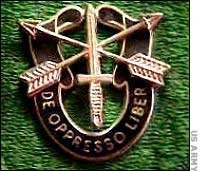- Home
- Shows
- Black Gold
- Body of Evidence
- Caribbean Cops
- Crisis Point
- Disorder in the Court
- Dominick Dunne's Power, Privilege and Justice
- Forensic Files
- Haunting Evidence
- Hot Pursuit
- Inside American Jail
- Videos
- Schedule
- Dumb Blog
- truTV Library
OFFICER'S PRIVILEGE: THE COL. GEORGE MARECEK STORY
A Soldier's Story
To understand the controversy that surrounded the Marecek case, it is essential to understand the man. By all accounts, George Marecek was a man who had been forged almost from birth by unimaginable hardship. He grew up in Nazi occupied
Like thousands of other refugees from the shattered remains of Eastern Europe, young Marecek made his way through the maze of Displaced Persons camps and the deprivations of post war Europe, and finally managed to find someone who sponsored him so that he could move to the

Green Beret Emblem
It was soon after that he enlisted in the Army and found his way into the then fledgling Special Forces. Based to some degree on the rugged British commandos who during World War II performed what at the time seemed almost superhuman feats of arms, often behind enemy lines, from the beginning the Special Forces - which would later become known as the Green Berets - was a special unit in the American military landscape. Its members were athletic and intelligent; they were required to develop language skills and to be schooled, not just in special weapons and tactics, but also in psychological operations. Their mission, broadly sketched, was to work behind enemy lines, beyond the reach of conventional armies and the logistical bureaucracy needed to support them. They were trained to identify and cultivate local insurgent groups, and to live off the land while they were doing it.
In the early 1950s, when Marecek joined the organization, it was primarily viewed as a Cold War unit, a cadre of carefully selected and trained soldiers whose most likely enemy would be what was then, the most menacing country on Earth -- the



- Cape Fear
- "On the Beach"
- A Soldier's Story
- Honor and Duty
- Calling in the Reserves
- Czech and Mate
- Spies Like US
- Allaying Suspicion?
- Faithful to You, Jirga
- A Comrade Confides
- Anniversary
- Marking Time
- The Search Continues
- "I Found Her!"
- "Now I have Control of My Little Girl"
- A Complicated Case
- Trial and Error
- Allied Invasion
- Back to the World
- Bibliography

Join a conversation:

- » Robert Ackermann: Teen Cannibal
- » When Children Kill
- » More Horrors Revealed in Dungeon Dad Case
- » The Caylee Anthony Story -- Part One
- » The Peterson Evidence Photo Gallery
- » When Cheerleaders Hit Rock Bottom
- » Mistaken Myspace Suicide: The Megan Meier Case
- » The Woodchipper Murder Case
- » Kristin Rossum: The Rose Petal Murder
- » Porn Stars Who Fought the Law









